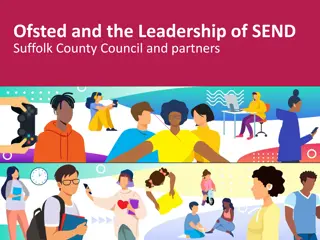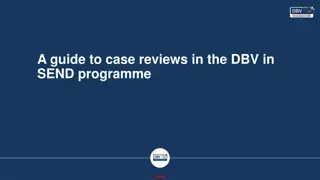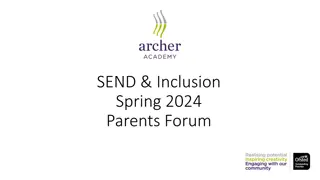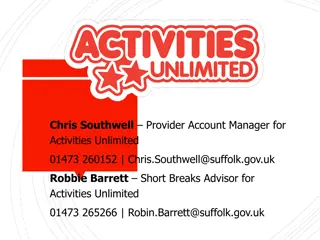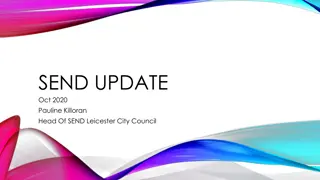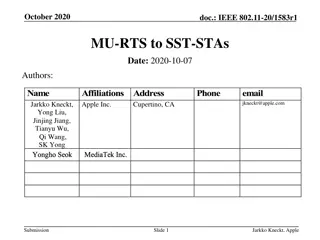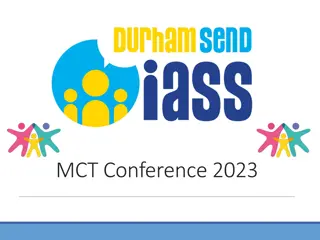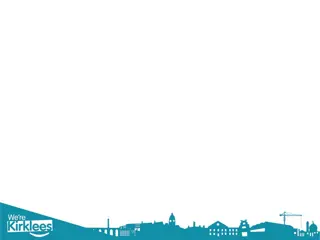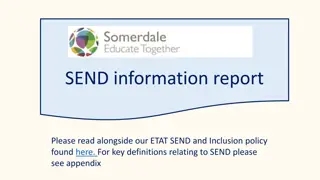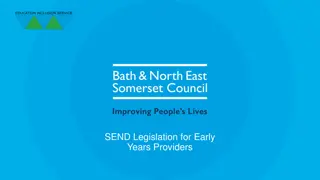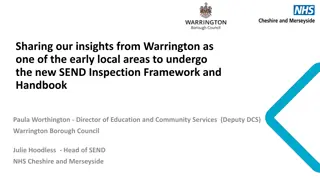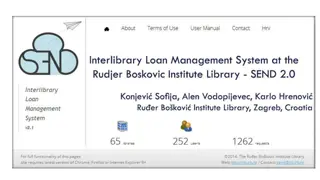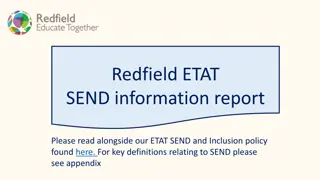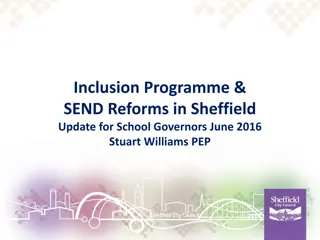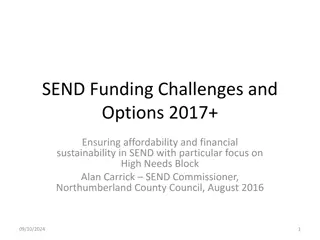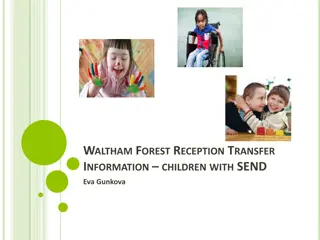
Unique Supportive Approach at Holy Trinity Catholic Primary Academy
"Discover how Holy Trinity Catholic Primary Academy ensures every child's needs are met through personalized support, early identification of special educational needs, regular assessments, and collaborative partnerships with parents. Join a school committed to inclusive education and holistic development for all students."
Download Presentation

Please find below an Image/Link to download the presentation.
The content on the website is provided AS IS for your information and personal use only. It may not be sold, licensed, or shared on other websites without obtaining consent from the author. If you encounter any issues during the download, it is possible that the publisher has removed the file from their server.
You are allowed to download the files provided on this website for personal or commercial use, subject to the condition that they are used lawfully. All files are the property of their respective owners.
The content on the website is provided AS IS for your information and personal use only. It may not be sold, licensed, or shared on other websites without obtaining consent from the author.
E N D
Presentation Transcript
Who makes this school Special? How will this school know that my child needs extra help? How does this school know that the help it offers is working? How will this school support my child? Who makes the decision about how much support my child receives? How will my child be included in activities outside the classroom? What can this school offer for the wellbeing of my child? Meet the SENCO! What training have staff at this school had to be able to support my child? What specialist services and expertiseare available to this school? How accessible is the environment at this school? How can I be involved in my child s education? How will I know what s happening? How will my child be involved in their education? Meet the SEN Governor! How does this school help pupils starting school and moving on? Click on the questions to view the answer page. Click on the question again to return to this page:
Who makes this school Special? Holy Trinity Catholic Primary Academy is a Catholic mainstream primary school and is part of the Our Lady of Lourdes Multi-Academy Trust. Holy Trinity is committed to inclusion and we see all of our children as unique individuals. We work collaboratively to enable each child achieves their full potential, whatever their ability or specific needs; providing a broad and balanced curriculum which incorporates equal opportunities for all children.
How will this school know if my child needs extra help? Holy Trinity Academy recognises that children learn and progress at varied rates and we use a range of teaching strategies and approaches, personalising provision to ensure that the learning needs of all pupils can be met. At Holy Trinity early identification of pupils with special educational needs is a priority. In order to identify those pupils with a special educational need, we use progress over time as a key indicator. The identification of pupil s with special education needs follows a graduated approach, beginning with quality first teaching. Progress is closely monitored by the class teacher and, if a child is not making expected progress, support is put in place focusing on the individual s specific needs. This support may be small group or individual work. If further support is needed the class teacher liaises with the SENCO to further personalise support and access outside agencies as necessary. At all times the school works in partnership with parents.
How does this school know that the help it offers is working? Teacher assessments are completed termly and this is analysed by the class teacher and the Senior Leadership Team. Parents are invited to attend review meetings to discuss the progress of pupil s with special educational needs and to update on the success of any interventions and provision which have been put in place. Class teachers and Teaching assistants working closely to ensure that progress is made and regularly update each other on an individual child or group s progress in order to adjust their planning accordingly. The SENCO works closely with class teachers to ensure a provision map is in place (where needed) and this is reviewed each term after analysis of progress with parents and outside agencies where appropriate. A Termly report to governors to update on practice and provision within school and the named SEN Governor meets annually with the SENCO to review the previous year and discuss areas for development. Each year, the SENCO produces an SEND action plan detailing successes and areas for development for the forthcoming year.
How will this school support my child? At Holy Trinity, we aim to provide every child with access to a broad and balanced education. This includes the National Curriculum in line with the Special Educational Needs Code of Practice, working in partnership with parents and acquiring specialist support where needed. All children receive Quality first teaching with an adapted curriculum according to pupil s needs. Targeted interventions may take place for individuals to help close the gap between a child with special educational needs and their peers. A provision map may be in place, detailing the personalised provision for that chid. All pupils on the SEND Support register have a Pupil Passport which outlines the child s strengths and areas of difficulty, with specific strategies and interventions identified and outcomes to be achieved. This enables children to have a voice in relation to their curriculum.
Who makes the decision about how much support my child will receive? Teachers attend termly progress meetings to discuss the needs of all individuals in the class and support is allocated according to need. SEN support is coordinated by the Headteacher and SENCO who carefully monitor and review that individual targets are being met and that pupils needs are catered for within the constraints of the financial resources available. Decisions about the type and amount of support that children receive is informed by consultations between: the pupils; parents/carers; Class teachers; Headteacher and SENCO; outside agencies; Senior Leadership Team; and, Governors. By working closely with parents and external professionals we seek to cater for the needs of every child who has special educational needs, so they can achieve their potential. If it is felt a child needs increasing support, the SENCO may discuss this with the Family of schools and additional funding may be given in accordance with agreed criteria for Nottinghamshire Schools.
How will my child be included in activities outside of the classroom? As a school we highly value the benefit of education outside of the classroom and believe that all children have the right to participate in these experiences. Children with special educational needs have access to all extra-curricular activities as offered to all children. For example: Residentials, lunch time clubs, after school clubs, etc. Where it is beneficial for a parent to participate alongside their child on school trips and visits, we will approach the parent at the planning stage. Medicines are administered in line with our school policy; there is a medical care plan in place for all children identified as needing this. Personal care is provided also in line with our school policy.
What can this school offer for the wellbeing of my child? We want all our pupils to feel happy whilst at our school. Teaching Assistants run interventions based on identified needs such as building self-esteem, social skills, developing friendships and anger management. Nurture support is available at playtimes. A trained ELSA Teaching Assistant provides targeted support individually or in groups Forest school s activities are timetabled for pupils each week in our Ecoland . Social awareness games and activities Lunch time and play time support / play partners Peer mentoring Access external agencies and professionals and follow their advice
Meet the SENCo! Mrs Sheila Boneham-Hill is the school s SENCO and she can be contacted via the school office.
What training have staff at this school had to be able to support my child? A range of training has taken place as a whole school and as individuals. We work closely with specialist services who train, guide and advise us, so that we deliver the best support for a child with SEND. During 2022-23, the following training has taken place: Safeguarding training for all staff Safeguarding and Child Protection Designated Person for Safeguarding GDPR E-Safety awareness Contextual Safeguarding CRB (previously known as MAPA) training EAL Network termly meetings Safer recruitment Paediatric First Aid I new ELSA TA trained RWI phonics whole school Interoception awareness Zones of Regulation ADHD awareness
What training have staff at this school had to be able to support my child? A range of training has taken place as a whole school and as individuals. We work closely with specialist services who train, guide and advise us, so that we deliver the best support for a child with SEND. Training to take place this academic year (2023-24) includes: Making sense of Autism Interoception Safeguarding training for all staff Keeping children safe in Education 2023 Safeguarding training for all staff Safeguarding and Child Protection GDPR Designated Person for Safeguarding E-Safety awareness Equality and diversity Safer recruitment Phonics WRI Dyslexia Tool Kit (NCC)
What specialist services and expertise are available to this school . Who can help us? Currently being accessed: Schools and Family Services (accessed through the family Springboard process) SFSS C and I Team SFSS S and P Team (sight and hearing) Educational Psychology Service (accessed through the family Springboard process) Physical Disability Specialist Services (PDSS) Occupational Therapy Speech and Language Therapy (SALT) Physiotherapy CAHMS Emotional Health and Well-being Service Healthy Families Team SBAP Social Services Small Steps Service Community Paediatricians The school has access to a range of agencies through the Family Springboard process Signposting to these organisations and services is mainly organised by the SENCO who work closely with other organisations, including the Healthy Families Team.
How accessible is the environment at this school? Part of the school budget is allocated to equipment and facilities to support pupils with special educational needs. The school is fully wheelchair accessible. Specialist equipment is accessed through the Physical Disability Specialist and Occupational Health Services.
How can I be involved in my childs education? How will I know what s happening? At Holy Trinity Academy, we recognise the vital and pivotal role that parents play in the education of their children and we strive to work in partnership. Parents are invited to their child s termly review, to discuss their provision, progress, targets and outcomes.
How will my child be involved in their education? Regular daily discussions take place between pupils and their class teacher and teaching assistant. Prior to a review meeting with parents, children will be invited to discuss what has worked well for them and how they feel about their education. Depending on the age and need of the pupil, this will be recorded in different ways.
Meet the SEN Governor! Mr Robert Beall is the school s SEND Governor and he can be contacted via the school office.
How does this school help pupils starting school and moving on? The admission arrangements for all pupils are in accordance with national legislation, including the Equality Act 2010. This includes children with any level of SEND; those with Education, Health and Care Plans and those without. See Admissions policy for more information. Robust transition arrangements are in place to ensure a smooth transition. Teachers meet to share academic and well-being information with the new class teacher. The children all have an opportunity to meet their new teacher and to be in their new classroom during the planned transition sessions in the Summer term. Additional transition arrangements may be in place for identified pupils. Transition to Secondary School is carefully planned and personalised through close liaison with the Secondary SENCO and is tailored to meet an individual s specific needs. Our ethos is to provide pupils with life-skills from the moment their education begins. These are taught discreetly through our curriculum, rewards, roles and responsibilities.

